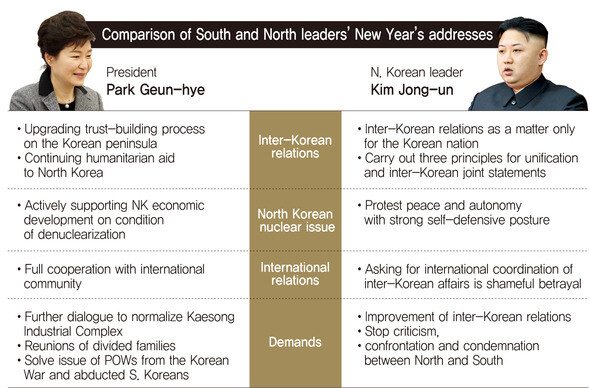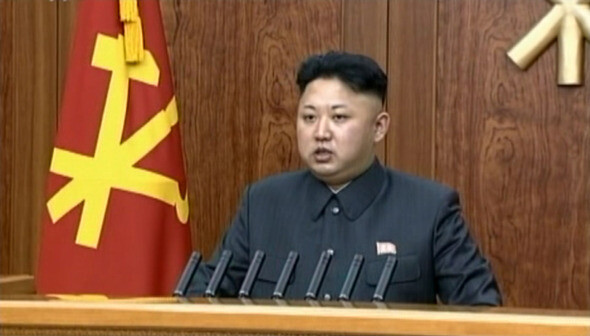hankyoreh
Links to other country sites 다른 나라 사이트 링크
Pres. Park and Kim Jong-un sound different tones in New Year’s addresses

By Choi Hyun-june, staff reporter
On January 1, North and South Korea’s top leaders greeted the new year with two very different New Year’s addresses. President Park Geun-hye, who turns 62 this year, showed a reluctance to take proactive steps to improve relations with Pyongyang, attaching various conditions to the process. North Korean leader Kim Jong-un, who is believed to turn 30 this year, demonstrated an active commitment to achieving the goal.
Toward the end of his address, which was aired on North Korea’s official Korean Central Television that morning, Kim mentioned improving inter-Korean relations a total of three times. He urged South Korea to “come forward in improving North-South relations” and said Pyongyang would “would actively to improve North-South relations.” He also said, “Anyone who values the nation and wants reunification will move forward regardless of what happened in the past.” This appeared to be an oblique reference to Park.
The reason North Korea is arguing so forcefully for improvements seems to be because relations remain so strained in spite of the efforts at dialogue it made last year. At the same time, Pyongyang also seems to desire stable relations with Seoul to preserve internal unity after the execution of onetime second-in-command Jang Song-thaek.
In the first half of 2013, inter-Korean relations seemed to be racing toward disaster, with North Korea’s third nuclear test, joint military exercises between South Korea and the US, North Korea’s talk of war, and the shutdown of the Kaesong Industrial Complex. Then came Pyongyang’s unexpected proposals for dialogue with Seoul and Washington and agreement with the South to reopen the Kaesong complex. It was something of a recovery, although no progress was reached with reunions of divided families and tourism at Mt. Keumgang. Today, the prospects of improvement are looking grim, with Jang’s execution triggering more talk in the South about waiting from the regime in Pyongyang to collapse.
The content of the addresses suggests that a positive response from Park to Kim’s demands could be a boon for inter-Korean relations as 2014 begins.
Yang Moo-jin, a professor at the University of North Korean Studies, said Kim showed “a proactive determination to set the mood for an improvement” in his address.
“There is a possibility the North could come out any moment with an offer for dialogue between authorities,” Yang said.
But Park’s four-page-long New Year’s statement, published the day before, showed her to be hesitant about taking steps to improve ties.
In it, the Park pledged to “establish an airtight security posture and a solid crisis management system for the eventuality of a North Korean provocation, while working more actively for peace on the peninsula and building a foundation for peaceful reunification.” The emphasis was more on strengthening security to gird for a possible provocation and working toward unification from a more long-term perspective than on making efforts to improve relations here and now.
Kim also said in his address that reunification should be “a matter among Koreans.”
“It is shameful toadyism and betrayal to take the issue of North-South relations to the outside and ask for international coordination,” he said at one point.
In addition to stressing “autonomy” in inter-Korean relations and showing Pyongyang’s feelings about being punished by the international community, the remarks also seemed to take aim at the Park administration’s attempts to use China’s influence to encourage changes in North Korea.
Park sounded a very different note on reunification, saying it should be “achieved in a way that benefits both sides, with the agreement of the neighboring countries involved” and pledging to “cooperate closely with the international community.” Her remarks reaffirmed the administration’s position in favor of leveraging the military alliance with the US and a strategic partnership with China to bring about North Korea’s denuclearization.
“If you just look at the 2013 New Year’s addresses, you can see that Kim didn’t make any reference then to improving inter-Korean relations,” said Cheong Seong-chang, a senior research fellow at the Sejong Institute. “This year, he mentioned it no fewer than three times, which is a sign of a fairly active commitment. It could be that conditions are somewhat favorable this year for pushing for inter-Korean dialogue.”
The Ministry of Unification’s political analysis division was more cautious in its interpretation. “While [Kim] did mention [creating] an atmosphere for improving inter-Korean relations, he also continued to denounce [South Korea],” it said. “We’ll have to watch and see how his attitude changes.”
One reason for the caution is the way North Korea’s promises and actual behavior have differed in the past. Kim’s address last year made reference to “reconciliation and unity of the Korean people,” only to be soon followed by a third nuclear test in late February.
The differing addresses by the leaders of South and North suggest that prospects for inter-Korean relations this year may be dim.
“The North and South Korean leaders are on completely different pages,” said Jeong Se-hyun, president of Wonkwang University and a former Minister of Unification. “North Korea is saying it’s willing to talk to anybody who desires unification, while the Park administration keeps insisting that everything needs to go through the government before it gets to the private sector.”
“The Park administration could decide to reject requests for interaction by South Korean private groups,” Jeong noted. “Relations with the North could get even worse than they are now.”

Please direct questions or comments to [english@hani.co.kr]
Editorial・opinion
![[Column] Season 2 of special prosecutor probe may be coming to Korea soon [Column] Season 2 of special prosecutor probe may be coming to Korea soon](https://flexible.img.hani.co.kr/flexible/normal/500/300/imgdb/original/2024/0426/3317141030699447.jpg) [Column] Season 2 of special prosecutor probe may be coming to Korea soon
[Column] Season 2 of special prosecutor probe may be coming to Korea soon![[Column] Park Geun-hye déjà vu in Yoon Suk-yeol [Column] Park Geun-hye déjà vu in Yoon Suk-yeol](https://flexible.img.hani.co.kr/flexible/normal/500/300/imgdb/original/2024/0424/651713945113788.jpg) [Column] Park Geun-hye déjà vu in Yoon Suk-yeol
[Column] Park Geun-hye déjà vu in Yoon Suk-yeol- [Editorial] New weight of N. Korea’s nuclear threats makes dialogue all the more urgent
- [Guest essay] The real reason Korea’s new right wants to dub Rhee a founding father
- [Column] ‘Choson’: Is it time we start referring to N. Korea in its own terms?
- [Editorial] Japan’s rewriting of history with Korea has gone too far
- [Column] The president’s questionable capacity for dialogue
- [Column] Are chaebol firms just pizza pies for families to divvy up as they please?
- [Column] Has Korea, too, crossed the Rubicon on China?
- [Correspondent’s column] In Japan’s alliance with US, echoes of its past alliances with UK
Most viewed articles
- 1[Column] Season 2 of special prosecutor probe may be coming to Korea soon
- 2No good, very bad game for Korea puts it out of Olympics for first time since 1988
- 3‘We must say no’: Seoul defense chief on Korean, USFK involvement in hypothetical Taiwan crisis
- 4Division commander ordered troops to enter raging flood waters before Marine died, survivor says
- 5Is Japan about to snatch control of Line messenger from Korea’s Naver?
- 6Korea’s 1.3% growth in Q1 signals ‘textbook’ return to growth, says government
- 7Is N. Korea threatening to test nukes in response to possible new US-led sanctions body?
- 8[Editorial] Korea’s surprise Q1 growth requires objective assessment, not blind fanfare
- 9[Editorial] New weight of N. Korea’s nuclear threats makes dialogue all the more urgent
- 10[Editorial] In the year since the Sewol, our national community has drowned